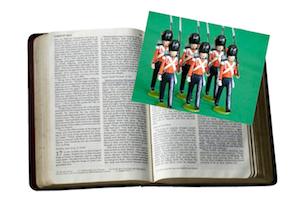 Continuing our look at what the Bible has to say about war, we come to the time of the judges.
Continuing our look at what the Bible has to say about war, we come to the time of the judges.
As we mentioned, the Conquest had been incomplete. As horrified as we may be at the instructions God gave the Israelites, we should be just as horrified at the cost of their not following those instructions. The Promised Land did not become what it was meant to be, because the Israelites spared some of the people that were living there and because they failed to destroy the idols of those people.
During most of the period of the judges, Israel was a nation only in the loosest sense of the word. The best description is “the twelve tribes of Israel,” for this was basically a loose confederation of tribes. The Law established no government, and, as the writer of Judges describes it, “there was king over Israel and each man did what was right in his own eyes.” It wasn’t meant to be that way, of course. As Gideon rightly recognized, God was intended to be the ruler of Israel, and each man should have done what was right in God’s eyes. But that didn’t happen.
They were basically polytheistic, with brief moments of revival and turning to God. During most of this time, they were oppressed by other peoples. God would raise up judges, deliverers of his people who would fight the enemy and free Israel from this foreign domination. At times the judges basically acted alone, like Samson. At other times, they led the entire nation, like Ehud. Most of the time, they directed a few of the twelve tribes, leading them to military victories.
Most of the fighting in the book of Judges is defensive, trying to expel foreign invaders. Some of it, particularly at the beginning of the book, is a continuation of the Conquest. That can be said for almost all of the fighting we see in the Old Testament.

Tim,
Do you think it’s relevant at all the to discussion of pacifism/violence that in the book of Judges, the foreign invaders were often “raised up” by God? In other words, God indirectly put them in this self-defensive posture, no?
–guy
Interesting thought, Guy. There’s also no hint of successful defense except when God directly intervened.
Finally read the homework from last week or so. Too many things to respond about so to keep it to the current theme I find the saying “each man did what was right in his own eyes.” a true history on man himself. Men want God – but not really, Men want justice – but not really. Men want (fill in a Godly virtue) – but not really. There’s a neat painting by, I think Michelangelo, showing God reaching out to his creation – and man (Adam), passively holding out his arm and looking at the world. Because of man’s sinful nature, including pride and arrogance, he finds it better if he owns his own life. Israel, whether under judges or kings attempt to do the same by being a basically a polytheistic nation but yearning for the riches and other gods around them. I am beginning to think, in general terms, that it did not matter what nation of people God chose. Man would still turn away from the creator, and salvation of the soul would still truly depend on God’s love for us than our off and on love for the creator. Israel could not destroy those around them, for they were enamored by the world about them. Making treaties with ungodly nations around them was profitable in the eyes of their leaders, and surly, profitable decisions are Godly decisions. Right?
Good thoughts, Ed.
Pingback: THE CHRISTIAN AND PACIFISM « Committed To Truth